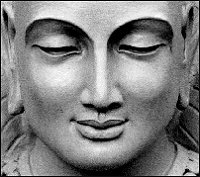The Trouble with Unhappiness
 I read this on my way to yoga class: “Meditation, yoga, acupuncture, magnets, herbs, and aromatherapy are all variations on the placebo principle. They bring patients to ‘a state of weakened rational activity, filling the emptiness in their lives with romantic notions and grabbing hold of them with useless substances,’” in a Wilson Quarterly review of a book called Artificial Happiness: The Dark Side of the New Happy Class, by Ronald Dworkin, a practicing doctor with a Ph.D. in political philosophy. I bought the book right away. I’m a pessimist. This is not a quality that I like very much in myself, but I find it useful; you’re disappointed much less often when you don’t expect good things to happen to you. I tend to see the dark side of almost anything and agree wholeheartedly with Hobbes’ that “the life of man [is] solitary, poor, nasty, brutish, and short.” I find it almost impossible to reconcile myself to the imperfection and uncertainty that are the constants of human life; I don’t believe happiness is possible in the presence of imperfection and uncertainty (as my husband, for example, does). So I dove into Dworkin’s book head first, greedy for evidence that happiness of any kind is an illusion.
I read this on my way to yoga class: “Meditation, yoga, acupuncture, magnets, herbs, and aromatherapy are all variations on the placebo principle. They bring patients to ‘a state of weakened rational activity, filling the emptiness in their lives with romantic notions and grabbing hold of them with useless substances,’” in a Wilson Quarterly review of a book called Artificial Happiness: The Dark Side of the New Happy Class, by Ronald Dworkin, a practicing doctor with a Ph.D. in political philosophy. I bought the book right away. I’m a pessimist. This is not a quality that I like very much in myself, but I find it useful; you’re disappointed much less often when you don’t expect good things to happen to you. I tend to see the dark side of almost anything and agree wholeheartedly with Hobbes’ that “the life of man [is] solitary, poor, nasty, brutish, and short.” I find it almost impossible to reconcile myself to the imperfection and uncertainty that are the constants of human life; I don’t believe happiness is possible in the presence of imperfection and uncertainty (as my husband, for example, does). So I dove into Dworkin’s book head first, greedy for evidence that happiness of any kind is an illusion.I was disappointed at first by his prose. It reads to me like an undergraduate’s research paper. He harps on the same few ideas; he beats you over the head with his thesis, which is that Americans rely on pills to induce in their minds a state of artificial happiness that is entirely disconnected from the facts of their lives. Husbands and wives stay in bad marriages, fearing financial ruin or solitude if they divorce, and anesthetize themselves to the misery of living with a person they cannot get along with by taking antidepressants. Their lives suck, they admit, but that doesn’t trouble them any more. Unhappiness has ceased to be, for these people, a sign that they have to take stock of what’s happening in their lives and make changes. Rather, Dworkin writes, it has become a disease to be treated by popping pills the way you would treat a toothache.
I’m with Dworkin so far. But he gets stuck in this jeremiad. He keeps berating people who look for the easy way out of their unhappiness without exploring the reasons they do it; to him, it’s simply laziness. He doesn’t consider that unhappiness is a complicated state of mind, and that taking the easy way out is a way to cope with a situation for which, as I see it, there’s no long-term solution. To me unhappiness is like slow metabolism, a chronic condition you are stuck with and cannot cure even after years of doing the hard work. I struggle with pessimism and unhappiness every single day. It’s one of the reasons I take yoga. It’s one of the reasons I cannot easily dismiss therapies that rely on the placebo effect. I dislike very viscerally the approach of drugging yourself into a state of not caring about what’s going on in your life. At the same time, I have to acknowledge how painful it is to be aware of your condition as a human being, of the limitations of your reason and your emotions, of the narrowness of your understanding of other human beings and of the world around you. I don’t think it is possible to have that awareness of yourself and be happy. And I don’t think it’s possible not to wish very desperately to be happy in spite of all that.
Perhaps yoga does work on the placebo effect. I started practicing it to keep fit; it’s the only form of exercise I have been able to stick with for several years. Very slowly I became interested in yoga philosophy, but it hasn’t taught me anything more harmful than to be breathe deeply and stay calm (both of which enable me to make more balanced decisions in moments of crisis), and to expect results only after long, committed practice. It hasn’t filled my life with empty romantic notions. It has taught me that going with the flow is sometimes better than trying to fight what is happening to me. I’ve thought about the ethical implications of this approach, and I do not like all of them. I don’t want to go with the flow when innocent people are harmed and discriminated against, when policies are being enforced that destroy the planet on whose resources we depend. But I do want to go with the flow when I’m stuck in traffic and can do nothing to change the situation, when I have to deal yet again with my mother questioning my choice to become a vegan. In those cases I don’t think unhappiness is of any use to me.
Dr. Dworkin seems to think that unhappiness is always useful, and that eliminating it by methods other than philosophy and psychotherapy is a cop-out. He doesn’t acknowledge that there are things that make us unhappy that we can do nothing about, and that this is a situation extremely difficult to live with. He has no sympathy for people who fumble about looking for ways to work out what troubles them, for people who do not have the inclination and time for philosophy or the money for therapy. I appreciate the work he’s trying to do; it is important work. But I don’t think you can do it with the kind of black-and-white and faintly contemptuous attitude about unhappiness that I see on every page of his book.







